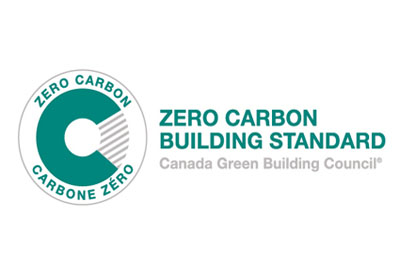CaGBC Opens Zero Carbon Building Program Registration

November 9, 2017
The Canada Green Building Council (CaGBC) has opened public registration for Canada’s first Zero Carbon Building (ZCB) Program, which provides third-party verification of compliance for zero carbon design and performance. This world-class Standard positions Canada as a global leader, offering designers and operators the opportunity to make carbon reduction the key indicator for building performance. In order to achieve large-scale market transformation, the Standard is designed to be broadly applicable across many types of new and existing buildings, and aligns with recent and upcoming federal and provincial policies that target net zero performance. The ZCB Program joins CaGBC’s other successful programs in providing solutions for the industry as it prepares for a carbon constrained future and a rapidly evolving economy.
“I am confident that the Canadian building industry is ready to lead the global shift to zero carbon by building on the extensive experience and capacity delivering LEED across the country,” says Thomas Mueller, President and CEO of the CaGBC. “The CaGBC Zero Carbon Building Standard provides the framework to guide the industry toward achieving zero carbon performance, and to making real progress in moving to a low-carbon economy.”
A part of CaGBC’s Zero Carbon Buildings Initiative, CaGBC has been working with 16 Zero Carbon Pilot Projects across the country. This elite group represents the broad applicability of the Standard, with both new and existing projects ranging in size from 20,000 to 1.3 million sq. ft. found across the country. Many of the Pilots are now completing the design stage and report that they have found the ZCB Standard key to shaping their design strategies.
“The CaGBC’s new Zero Carbon Building Standard charts an innovative, bold new course for the future of buildings. Oxford is piloting the standard because it will help us meet the changing expectations of our customers and future proof our buildings, all while doing the right thing for our community,” says Andrew McAllan, Head of Real Estate Management, Oxford Properties Group who has two projects in the ZCB Pilot.
For the West 8th and Pine Mixed-Use Pilot Project proposed in Vancouver, CaGBC’s ZCB Standard is a way to achieve a deeply sustainable development while also helping them comply with the City of Vancouver’s new Zero Emissions Building Plan.
“Although we’ve been proponents and early adopters of high performance and sustainable building features, we recognize that incremental improvement is not moving the dial far enough and that we need a fundamental and transformative shift in how we design, specify, and build-out our projects,” says Kirk Robinson of Delta Land Development who owns this project. “With this in mind, the principles that the project team have started to identify for our 8th and Pine mixed-use development align perfectly with the CaGBC Zero Carbon Building Pilot Project Program, in particular as we want this project to ultimately serve as a demonstration to the private sector development industry that these measures are viable, on-market, and the way forward.”
The MacKimmie Complex Redevelopment at the University of Calgary is a Pilot Project aiming to be the first zero carbon building on campus. It will include the retrofit of a 14-storey tower and the construction of a new building that will include a double-skin façade – one of the first projects in Canada to use this technology.
“Our participation in the CaGBC’s Zero Carbon Building Standard pilot program offers University of Calgary the opportunity to learn from our peers and contextualize it to the Alberta energy environment with an eye to fiscal responsibility, while still delivering the space and program that supports the needs of our campus,” says Boris Dragicevic, Associate Vice President of Facilities Development at U of C.
A full list of pilot projects can be found here.
Along with registration and detailed pricing information, a new Zero Carbon Building (ZCB) Workbook is now available. The Workbook helps calculate the net carbon balance of a building, provides enhanced support for advanced calculations, and includes guidance to ensure that all required documentation is provided. Energy Modelling Guidelines have also been released, which provide clarity on the key metrics of the standard for energy professionals. The CaGBC will be providing additional guidance, education and support for the Standard over the coming months.
Those interested in registering for the CaGBC ZCB Program or in learning more about the Standard and its requirements can visit the website at cagbc.org/zerocarbon.











![Guide to the Canadian Electrical Code, Part 1[i], 26th Edition– A Road Map: Section 56](https://electricalindustry.ca/wp-content/uploads/2022/11/Guide-CE-Code-2.png)



